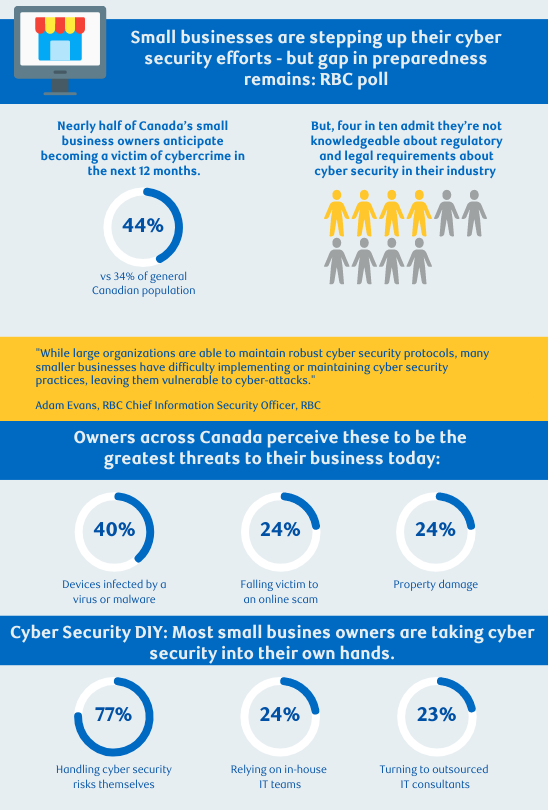Published February 28, 2022 • 3 Min Read
A recent RBC Small Business Poll1 reveals that small businesses are mindful of cyber risks, but there are gaps in preparedness. See how businesses are approaching cyber security today.

Small businesses are stepping up their cyber security efforts – but gap in preparedness remains: RBC poll
Nearly half of Canada’s small business owners anticipate becoming a victim of cybercrime in the next 12 months (vs 34% of general Canadian population).
But, four in ten admit they’re not knowledgeable about regulatory and legal requirements about cyber security in their industry.
“While large organizations are able to maintain robust cyber security protocols, many smaller businesses have difficulty implementing or maintaining cyber security practices, leaving them vulnerable to cyber-attacks.” Adam Evans, RBC Chief Information Security Officer, RBC
Owners across Canada perceive these to be the greatest threats to their business today:
-
Devices infected by a virus or malware
-
Falling victim to an online scam
-
Property damage
Cyber Security DIY: Most small business owners are taking cyber security into their own hands.
-
Handling cyber security risks themselves
-
Relying on in-house IT teams
-
Turning to outsourced IT consultants
Acknowledging that your business is at risk of cyber attacks is an important first step. Next comes preparing your business and mitigating the risk. This Fraud Awareness month, take time to focus on protection measures with these five steps.
To develop their cyber security mitigation and crisis management plans, small businesses can consider:
1. Prioritizing measures including multi-factor authentication, mandatory employee training and limited authority to install software.
2. Thinking through risks and creating a prioritized list of possible cyber events unique to the organization.
3. Identifying key stakeholders and putting together a list of key contact information, both technical and non-technical persons in the event their services or contact is needed.
4. Outlining an engagement procedure, which will guide the organization’s plan in response to a cyber event, detailing how events will be handled and communicated.
5. Creating a communications template used to address impacted parties in the event of a cyber security incident.
Want some help managing your cyber security?
The RBC Cyber Security Awareness and Education Website has been designed to help small business owners and the community with the latest in cyber security insights, best practices, tips, and guidelines.
More resources & tips:
-
Three Ways to Protect Your Business from Cyber fraud [Podcast]
-
Five Cyber Fraud Survival Tips to Protect Your Business in a Digital Workplace
1 About the Survey The RBC 2021 Cyber Security Poll was conducted by Ipsos Canada from August 24-27, 2021. More than 3,000 surveys were completed online by Canadian adults, represented in six different regions (British Columbia, Alberta, Saskatchewan/Manitoba, Ontario, Quebec and Atlantic Canada). Representative sample results are weighted to reflect the Canadian population. The precision of Ipsos online polls is measured using a credibility interval. In this case, the poll is accurate to within ± 1.8 percentage points had all Canadian adults been polled. The credibility interval will be wider among subsets of the population represented. All sample surveys and polls may be subject to other sources of error, including, but not limited to, coverage error, and measurement error.
This article is intended as general information only and is not to be relied upon as constituting legal, financial or other professional advice. A professional advisor should be consulted regarding your specific situation. Information presented is believed to be factual and up-to-date but we do not guarantee its accuracy and it should not be regarded as a complete analysis of the subjects discussed. All expressions of opinion reflect the judgment of the authors as of the date of publication and are subject to change. No endorsement of any third parties or their advice, opinions, information, products or services is expressly given or implied by Royal Bank of Canada or any of its affiliates.
Any information, opinions or views provided in this document, including hyperlinks to the RBC Direct Investing Inc. website or the websites of its affiliates or third parties, are for your general information only, and are not intended to provide legal, investment, financial, accounting, tax or other professional advice. While information presented is believed to be factual and current, its accuracy is not guaranteed and it should not be regarded as a complete analysis of the subjects discussed. All expressions of opinion reflect the judgment of the author(s) as of the date of publication and are subject to change. No endorsement of any third parties or their advice, opinions, information, products or services is expressly given or implied by RBC Direct Investing Inc. or its affiliates. You should consult with your advisor before taking any action based upon the information contained in this document.
Furthermore, the products, services and securities referred to in this publication are only available in Canada and other jurisdictions where they may be legally offered for sale. Information available on the RBC Direct Investing website is intended for access by residents of Canada only, and should not be accessed from any jurisdiction outside Canada.
Share This Article






